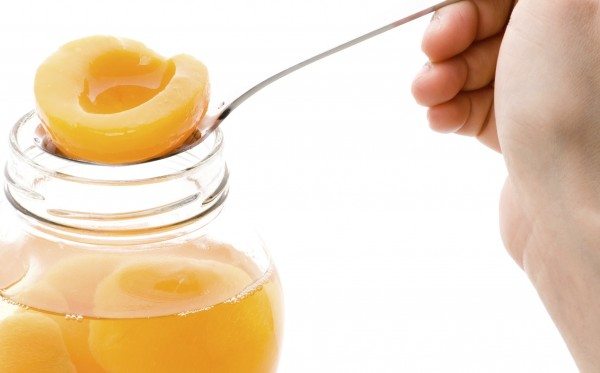
Playing Food Detective
Hi Amy,
I have some random, unrelated food questions for ya:
1) My son LUUUUUUVVS canned fruit. During the summer I give him fresh fruit, but in the winter I usually resort to canned, and he seems to prefer it. Is there a nutritional difference in canned fruit and fresh fruit? How about frozen fruit? Are there terrible horrible things in the can itself, or that happen to the fruit in the canning process, that are going to do harm to my son?
 2) How come my organic milk, in a cardboard milk container, has an expiration date like five billion years from now? The regular, yummy, taken from cows fed steroids and pesticides, in a plastic container, milk expires like a week after I buy it. The organic, in a cardboard container milk lasts like five weeks. Is it the milk itself? Or the container? If it’s the container, why doesn’t ALL milk come in cardboard containers?
2) How come my organic milk, in a cardboard milk container, has an expiration date like five billion years from now? The regular, yummy, taken from cows fed steroids and pesticides, in a plastic container, milk expires like a week after I buy it. The organic, in a cardboard container milk lasts like five weeks. Is it the milk itself? Or the container? If it’s the container, why doesn’t ALL milk come in cardboard containers?
3) I don’t drink coffee, but we have a coffee maker for when guests visit. They won’t let me wash the coffee pot with soap and water. I am only allowed to rinse with water. What gives? That just seems gross. They claim the coffee pot tastes like soap if I wash it. Ummmm… How’s it different than me washing your coffee MUG with soap and water?
Thanks!
Food for Thought
1) While many of us may have knee-jerk reactions to canned food vs. fresh in the “fresh is always better!!1!omg” direction, the truth is that nutritionally, there is actually very little difference. In fact, if you’re using canned or frozen fruit in lieu of buying something super out-of-season for the time of year or your part of the country, it can actually be BETTER, since the fruit was preserved at the peak of freshness. The “fresh” fruit that was harvested miles and miles away and shipped to your store has long since started losing nutrients.
There are things to consider though, when choosing canned fruit. If you value organic, most of the major supermarket brands are still using pesticides on their crops. And many canned fruits have been peeled, thus dinging their fiber content. (Though if you’re still peeling fresh fruit for your toddler, no biggie.) If you can find a variety with the peels intact, that’s a nice score. But really, the most important thing to avoid are the fruits canned in syrup or with other additives — ridiculous extra sugar and sodium. We preserved fresh peaches this summer that we’d picked ourselves, though the process we used definitely makes them more of a dessert item than a viable fruit alternative — think honey, light syrup, bourbon — but it is possible to find 100% preserved fruit without the sweetener garbage for everyday use. Just read the labels.
In the end, if your kid prefers canned or frozen fruits and vegetables, go for it, and don’t sweat it. Just be happy he’ll eat them at all.
(Update: commenters below provide info about BPA lining in cans and lids of jars)
2) The expiration date difference between organic and regular milk has nothing to do with the container, or with the milk being “organic.” It’s a different preserving process. Because organic milk producers are fewer and farther between in this country than “traditional” dairies, the milk simply has to travel longer and farther to keep up with the national demand for hormone- or antibiotic-free milk.
Most organic milk is preserved using something called ultrahigh temperature (UHT) processing. The milk is heated to 280 degrees Fahrenheit (138 degrees Celsius) for two to four seconds, killing any bacteria in it. Pasteurization involves heating milk to about 160 degrees F (71 degrees C) for at least 15 seconds, OR to 145 degrees F (63 degrees C) for at least 30 minutes.
The temperature difference means that pasteurization doesn’t kill ALL the bacteria in the milk — you won’t get sick when you drink it fresh, or anything, but the longer it sits on the shelf, the more time the remaining trace bacteria has to regroup and grow and make the milk go bad. UHT, on the other hand, kills EVERYTHING, though it does make the milk taste a little different to our American taste buds who grew up with standard pasteurized milk. (UHT is used pretty much exclusively for milk in Europe.) I’ve grown pretty used to the slightly-sweeter taste of organic milk from the store, though I admit I HUGELY prefer the super-fresh, super-minimally-processed organic milk we can buy at our local farmers’ market. That stuff tastes so good we never have any problem with the shorter shelf-life — it’s gone in a couple days, usually.
3) Your guests are correct. Do not use soap on a coffee maker, either the internal parts or the carafe. It leaves a taste. Sure, you can wash a coffee cup with soap but there’s just so much….well, SCIENCE going on inside a coffee maker that makes it a different animal. The water, heat, chemical makeup of the beans, brewing process, etc. I used to use dish soap occasionally on our carafe (I thought the no-soap thing was an old wives’ tale) and suddenly realized that wow, this coffee tastes TERRIBLE all of a sudden, no matter what I did. The internet claims soap will bind with the oils left behind from the coffee and not rinse away completely, but all I know is that I switched to the recommended cleaning process and it’s really much better.
To clean the carafe, ice cubes, water and a little table salt swished around really does the best job. (If you have a glass carafe, only add ice once it’s cooled.) Though most days I go with plain ol’ water, like your guests recommended. For the coffee maker itself, a solution of one part vinegar to two parts water is recommended about once a month for a coffee maker that sees heavy use — you could probably get away with doing it just once in a blue moon. Brew a full pot using the one-to-two ratio, then turn it off and let it cool in the carafe. Pour the solution out and rinse the carafe in warm water, then brew TWO pots of plain water to fully rinse away the vinegar solution. (If your coffee maker is in really bad shape, repeat the vinegar process again before the rinse cycles.) Ta-da! Your coffee maker is free of hard water residue or old oily build-up and ready to please your biggest coffee-snob friends.

